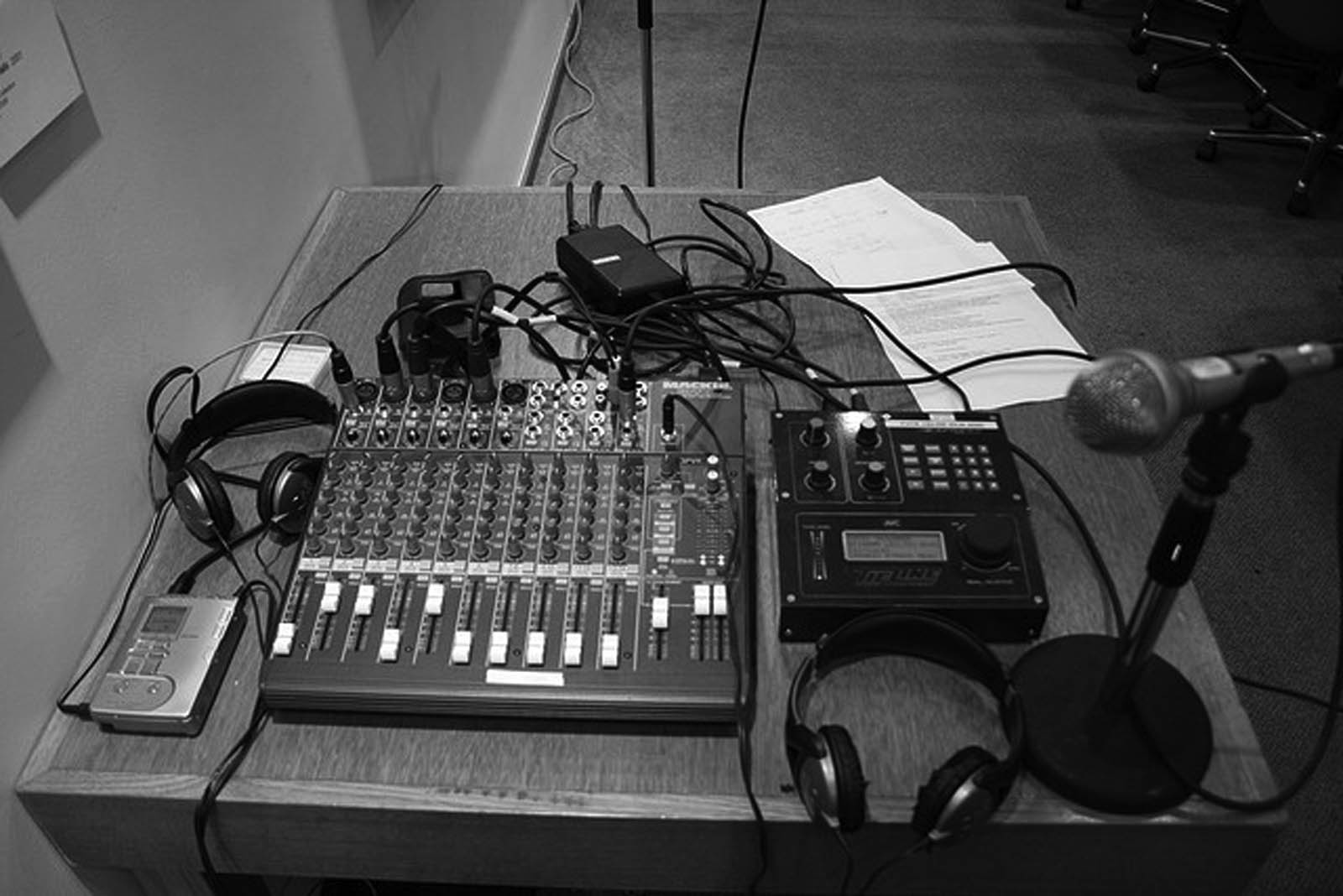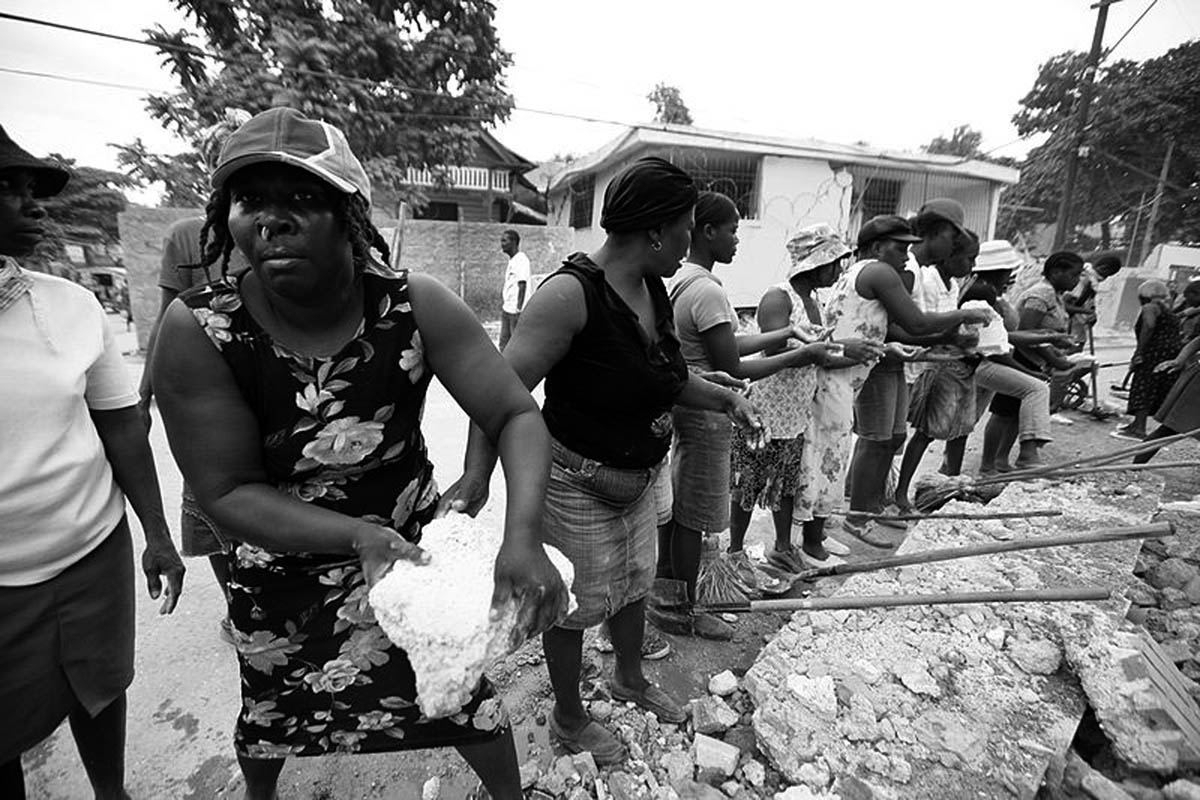
The Voice of Post-earthquake Haitian Women
“Your voice, the voice of the Haitian women, echoes across the country. We women need to take active part in all the phases of the re-establishment of our country.”
These were the words from the radio magazine REFRAKA 1, which were recently heard over the airwaves of different community radios in Haiti. More than eight months after the earthquake, these words still demonstrate the urgent need for the participation of Haitian women in all the efforts to rehabilitate the country. One of the crucial contributions of this effort includes the REFRAKA radio programme, which is produced by and for Haitian women.
The impact of the earthquake
On January 12, 2010 Haiti was hit by an earthquake with a magnitude of 7.3 on the Richter scale. The strength of the earthquake brought severe devastation to the country and resulted in the loss of thousands of lives. According to the Haitian government, 222,570 people were killed, while millions of others were injured or disabled, and 1.5 million people were left homeless. The earthquake has likewise destroyed hospitals, schools and churches, destabilising the entire country.
Community radios and their support organisations, as well as the network of women in community radio (REFRAKA) was also greatly affected. The offices of REFRAKA in Port-au-Prince collapsed and like many other organisations, REFRAKA lost a large part of their institutional memory—the accumulation of nine years of its work and experience under the debris; including documents (projects, reports), administrative files, audio materials, and equipment among many others. One of REFRAKA’s member stations, Radio Zetwal Payizan, located in Fondwa (Léogane), lost everything as a result of the earthquake, including the life of one of its hosts.
Despite this tragic event – which was one of the worst disasters in history according to the United Nationsi, radio activists and defenders of the women’s right to communication along with the entire Haitian women’s movement immediately concentrated their efforts, working in collaboration with one another.
Despite this tragic event – which was one of the worst disasters in history according to the United Nations1, radio activists and defenders of women’s right to communication, along with the entire Haitian women’s movement immediately concentrated their efforts, working in collaboration with one another. Firstly, to pay homage on March 8, 2010 to the women victims of the earthquake, and more concretely to provide front line services, acting as both a source of information and hope that were both vital for a population in a state of shock.
The disaster hit and haunted a population already weary from instability and unrest brought about by long standing political turmoil. The country’s long drawn political struggle and its resulting violence were aggravated by the enormity of the effects of the earthquake as well as the urgency of responses needed. These realities put many women in extremely vulnerable conditions. Women are faced with increasing economic hardships, yet they are burdened with more and more responsibilities as they have also increasingly become more active in the reconstruction and rehabilitation of their country. They also continue to experience violence, especially in emergency shelters. Thousands of women were left homeless by the earthquake, and as a result, were put in precarious situations.
Haiti has a strong oral tradition – making community radio an effective communication tool especially since illiteracy is widespread Community radio provides a space for women as agents of social communication to encourage and promote the political participation of women, especially as the next election takes place by the end of 2010.
Less than a month after the earthquake, REFREKA resumed its operations – organising two radio production trainings and producing a series of radio magazines about the situation of the women after the earthquake2. These hour long programmes are broadcasted by REFRAKA’s 25 community radio members, and can be heard in schools and other places of collective listening. The different themes discussed focus on the situation of women during natural disasters and are presented in forms of reportages, analyses, advices and testimonies.
Violence against women
Throughout the crisis that Haiti continues to experience post-disaster, certain sectors of the population are particularly vulnerable and need special attention. A report prepared by Michel Frost, a specialist on the human rights situation in Haiti, illustrates that there was an increase in cases of violence against women by 150% in the months after the earthquake.3 The absence of security in the emergency shelters, the lack of adequate light at night, the absence or lack of sanitary installations, the lack of shelter and privacy and the forced sharing of tents with unknown persons are some of the main causes for the increase in sexual violence.4
Confronted with this reality, REFRAKA has decided to pay special attention to the issue of gender based violence. In their radio programmes information given includes practical advice on how to mitigate the conditions that can lead to violence against women and contact information of women’s organisations that provide front line services.
REFRAKA has established relations with local organisations and women’s shelters such as CONAP5, SOFA, Kay Fanm, Fanm Décidé among others. REFRAKA has interviewed the coordinators of these organisations, and has worked with them towards the improvement of the conditions of women in emergency shelters by carrying out consciousness raising activities, psychosocial assistance and self-defence trainings to fight violence against women in those places. The radio broadcasters of REFRAKA act as agents to circulate crucial information to a vulnerable population and at the same time provide information on nationwide and local activities to raise awareness about them.
International Solidarity
Amplifying the voices of the Haitian women is also done at regional and international levels. Latin-American women and their allies around the world have played an important role after the earthquake to support Haitian women by establishing the International Feminist Solidarity Initiative.6 This initiative was launched a few days after the earthquake, and aims to provide basic needs and mobilise the Haitian women; fostering direct communication with them. Regarding the latter, Feminist International Radio Endeavour (FIRE)7 has also established a communication centre that transmits audio reports, feeds their blog via their internet radio and electronic networks in different regions, as well as world wide.8
This Solidarity Initiative was very instrumental and timely in communicating to the international women’s movement how Haitian women wish to be supported in these difficult times. Moreover, the initiative has also brought to light activities by the Haitian women and made visible their great steadfastness and resilience to the international community. The initiative also demonstrated that the Haitian feminist movement, although mourning the loss of many women’s rights activists and much institutional knowledge, remains alive and ready to continue the long road towards a more equitable and equal society.
The values represented by this initiative are based on the full and meaningful participation of Haitian women in all decision-making processes, particularly on emergency aid for the reconstruction of the country, using of the Beijing Platform for Action (1995) and taking advantage of the adoption of the UN Security Council Resolution 1325.
Alongside these efforts, a collective was formed. It is composed of women’s organisations working in different fields and who are active in Haiti as well as at the international level. This collective produced and submitted a parallel report to the Post-Disaster Needs Assessment (PDNA) as sex-segregated analyses was absent in the PDNA.9 A preliminary version of this parallel report was launched at a press conference on the day of the donors’ conference, March 31, 2010 in New York. Nigel Fisher, the UN representative for the PDNA and one of the panelists at the press conference underlined the incomplete nature of the official document in regards to the equality of men and women. As such, he made a commitment to adopt certain eminent recommendations from the parallel report upon his return to Haiti.
The report10 addresses donors, international agencies and a number of women’s rights-based political affiliates. It was drafted to highlight the importance of the rights and the leadership of Haitian women in fostering the sustainable and egalitarian reconstruction of a Haiti that is more resilient to disasters.
The role that Haitian women in community radio have been playing, along with the support and international solidarity from several women’s organisations and collectives, has resulted in the pronounced and active participation of women in the reestablishment of Haiti after the earthquake. These efforts illustrate the importance of eradicating the marginalisation of Haitian women and also illustrates why it is important to continue to involve them in all levels and stages of rehabilitation and reconstruction.
Endnotes:
1 REFRAKA – Network of Haitian Woman Community Radio Broadcasters. Founded in 2001, REFRAKA accompanies women in community radio and supports them towards gender mainstreaming in the programmes of all its 25 member stations all over Haiti.
REFRAKA does not only fight against the discrimination of women but also strengthens their capacities to become true community communicators.
2 The report of the independent expert on the human rights situation in Haiti, Michel Forst, A/HRC/14/44, 3 May 2010, Page 1.
3 REFRAKA has been able to restart its activities thanks to the help and support from BRODERLIJK DELEN (BD), AMARC,
FOCAL and Development and Peace.
4 The increase of cases of violence against women is the figure declared by the National Haitian Police. The number of unreported cases must have equally increased.
5 The report of the independent expert on the human rights situation in Haiti, Michel Forst, A/HRC/14/44, 3 May 2010, Page 8.
6 The Coordination Nationale de Plaidoyer pour les Droits des Femmes (CONAP) an alliance of more than 20 women’s organisation that join their effort to advance their demands and change the conditions for women in Haiti.
7 The initiative is also know under the name International Feminist Solidarity Camp. The three organisations who launched this project are Colectiva Mujer y Salud from the Dominican Republic (www.colectivamujerysalud.org), Centro de Investigación para la Acción Femenina (CIPAF) from the Dominican Republic (www.cipaf.org.do) and Feminist International Radio Endeavour (FIRE) from Costa Rica (www.radiofeminista.net). FIRE was the first international radio on internet, created and managed by women from Latin-America and the Caribbean.
8 The Observatory on the regional development and sex-segregated analyses (ORÉGAND) has translated into French and sometimes Creole short announcements and press releases on the International Feminist Solidarity Initiative. (www.oregand.ca). Visit also www.solidaridadfeministaayiti.org for information in English, French, Portuguese, Spanish and Creole.
9 In the weeks after the earthquake, public servants of the Haitian government and representatives of international partners drafted a Post-Disaster Needs Assessment (PDNA). The PDNA is an integrated part of the National Action Plan of the Haitian government for the reconstruction of Haiti. This document serves as basis for the distribution of the funds granted at the international donors’ conference on March 31, 2010.
10 Ensuring Haitian Women’s Participation and Leadership in All Stages of National Relief and Reconstruction, A Gender Shadow Report of the 2010 Haiti PDNA.





 The
The 
 Isis Resource Center holds one of the largest feminist collections of materials in the Global South. With 40 years of publication experience, Isis holds a vast collection.
Isis Resource Center holds one of the largest feminist collections of materials in the Global South. With 40 years of publication experience, Isis holds a vast collection.